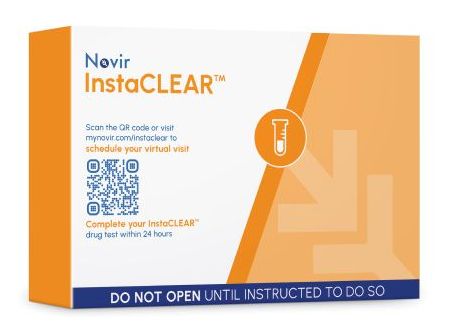Long gone are the days when truck drivers relied on coffee and amphetamines to stay awake for 48-hour trips. Not only is this behavior reckless, but it also violates federal law. Since 1991, commercial driver license (CDL) holders have been required to undergo federally mandated drug and alcohol testing to ensure road safety.
If you’re wondering whether every accident leads to a drug test, here’s the answer. DOT FMCSA regulations outline several situations requiring mandatory testing, including pre-employment, random testing, reasonable suspicion, follow-up, return-to-duty, and post-accident scenarios.
Reliable DOT Testing Services
For companies that need DOT compliance management, InOut Labs serves as a trusted Consortium/Third Party Administrator. They provide fast, accurate test results delivered directly to your inbox.
Their comprehensive drug testing services include:
- Reasonable Suspicion Drug Tests
- Pre-Employment Drug Tests
- Random Drug Tests
- Post-Accident Drug Testing
- Breath Alcohol Tests
With strict regulations in place, DOT drug testing plays a critical role in keeping roads safe and ensuring that commercial drivers remain fit for duty.
Why Should Truck Drivers Be Drug Tested?
Because it’s the law.
It doesn’t matter if you’re a carrier (employer) or an owner-operator (self-employed truck driver); you need to be in a drug testing program if the vehicle(s) you operate meet one of the following conditions:
- Gross Vehicle Weight Rating (GVWR) or Gross Combination Weight Rating (GCWR) of 26,001 lbs. or more
- Capable of Transporting 16 passengers or more
- Transport Hazardous Materials requiring placarding
Safety is critically important and the US Department of Transportation does not compromise. Drug testing ensures that others who are on the road with you are safe as well. Besides, CDL drug testing aims to make truck drivers more accountable for any of their actions.
Many people ask if truck drivers undergo regular tests. And yes, they do. The procedure is important for industry people who want safer travel.
Which Are the Situations in Which Commercial Drivers Need a Drug Test
Below are the situations where DOT Post-Accident drug and alcohol testing is required:
Accidents with Human Fatalities
As a truck driver involved in an accident with human victims that died, you must be tested for drugs and alcohol after the accident.
Citation, Ticket, and Towed Vehicle
When a truck driver is involved in an accident and s/he is issued a citation or a ticket, AND if the vehicle is damaged enough that it must be towed, the driver is also subject to post-accident drug and alcohol testing.
Citation, Ticket, and Injury
Cases in which the driver received a citation and a person has been injured enough that an ambulance must be called, also require post-accident drug and alcohol testing. The screening must be performed soon after the accident. The alcohol test must be performed no later than 8 hours, whereas the drug screening is not later than 32 hours. However, the ideal time frame is 2 hours for both tests.
Rule of Thumb: Unless there is a fatality, no ticket, no test
Can a CDL Driver be tested if s/he does not receive a citation?
Yes. But not a DOT test. An employer may conduct non-DOT post-accident drug and alcohol tests under company authority. A non-DOT test can include different drugs, and the reasons for a post-accident test can be defined by the employer.
How Long Until You Receive Drug and Alcohol Test Results?
Alcohol test results arrive immediately, while drug screening test results take longer. When an alcohol test comes back positive, the employer must immediately remove the driver from safety-sensitive work (driving). A positive alcohol test result carries serious consequences, just like a positive drug screening test. If a breath alcohol test shows 0.04 or above, the employer treats it the same as a positive drug test. A result between 0.02 and 0.039 means the driver cannot perform safety-sensitive duties for 24 hours.
Drivers who violate DOT regulations cannot drive again until they complete the Return-to-Duty Process. Negative results require no action. If the driver was involved in a qualifying accident, the employer must complete the alcohol and drug screening process as soon as possible. The FMCSA (Federal Motor Carrier Safety Administration) enforces strict regulations to keep public roads safe. These rules ensure accountability for both drivers and employers, especially when commercial drivers cause accidents with victims or property damage.
What Should You Expect from a DOT Drug Test?
As of this writing, DOT drug tests use only urine specimens. The DOT drug testing panel for five drug types.
The drugs that DOT drug tests search for are THC (cannabis, including hashish and marijuana), cocaine, amphetamines (including methamphetamine and MDMA), opioids (codeine, morphine, heroin, oxycodone, oxymorphone, hydrocodone, hydromorphone) and PCP.
All results are reviewed by a Medical Review Officer (MRO), a doctor with specialized training, who verifies prescriptions and acts as the gatekeeper for the drug testing process.
Preparing for a DOT Test
Whether you take a pre-employment, random, or reasonable suspicion alcohol test for drivers, the process remains the same. The DOT drug testing collection process follows strict guidelines, summarized below:
Go Directly to the Collection Site
As soon as an employer notifies an employee, the employee must head straight to the collection site. Immediately means that every action after notification must lead directly to specimen collection. Any delay could result in serious consequences.
Provide a Urine Sample
Upon arrival, the employee must present a photo ID to verify identity. Before giving a sample, the employee must empty pockets and leave all personal belongings outside the restroom. The facility secures water and cleaning products to prevent tampering. Unless a return-to-duty or follow-up test requires direct observation, the employee will have privacy during sample collection.
Failing to provide a sample before leaving the site results in a “refusal to test,” which carries the same consequences as a failed test.
Witness Sample Preparation
After handing the container to the collector, the employee watches as the collector splits the sample into two vials, seals them with tamper-evident tape, and asks the employee to initial them. Throughout this process, the employee must keep the urine sample within sight to ensure proper handling.
Sample Sent For Testing
Once the collection process ends, the lab receives the sample for analysis. The result then goes to the Medical Review Officer (MRO) for review. If the test indicates a potential issue, the MRO contacts the employee to discuss recent medications or other possible explanations for a positive result.
By following these steps, employees ensure compliance with DOT regulations and avoid unnecessary complications in their alcohol testing for drivers process.
Who Needs DOT Testing?
Drivers operating commercial vehicles over 26,001 pounds, including passenger and freight vehicles, must undergo DOT testing. Additionally, truck drivers responsible for transporting hazardous materials fall under the same requirement.
Another group that must comply includes drivers of vehicles carrying 16 or more passengers, including the driver. Since these roles involve public safety, DOT testing ensures that all drivers meet strict safety standards.
Conclusion
So, who needs DOT testing? The answer is clear—commercial drivers must undergo testing after a qualifying accident and for other reasons outlined by the DOT. Beyond accident investigations, DOT testing enhances safety by deterring drug use and ensuring responsible driving. In post-accident scenarios, the results can help determine liability and protect public safety.


